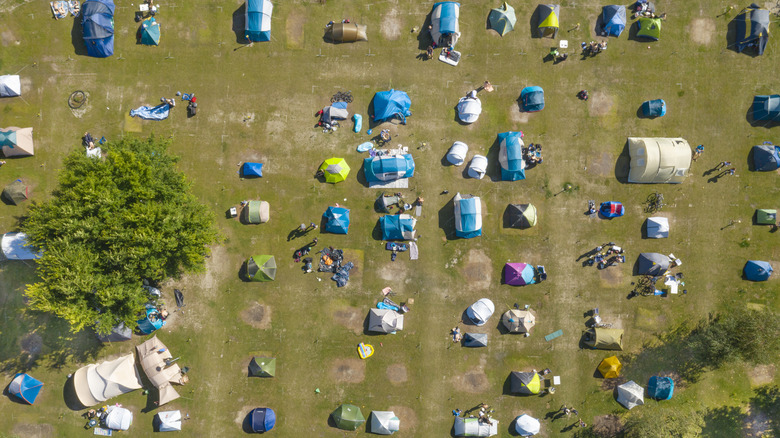The Major Difference Between Camping In Europe Vs America, Per Rick Steves
We may receive a commission on purchases made from links.
Whether you're camping in a national park or at a small backcountry campground, pitching a tent in the U.S. is usually about having a private experience in nature. According to an article by European travel expert and guidebook writer Rick Steves on his website Rick Steves' Europe, that's not the case on the other side of the Atlantic. For one thing, in Europe, camping doesn't necessarily mean going out into nature at all. Campsites are often close to cities, allowing people who don't have the budget (or don't want to spring) for a hotel room to spend their days exploring everything the city has to offer and then retreat to an affordable campsite nearby.
The culture around camping can be different, too. Americans are often frustrated to arrive at their campground and find that there are other groups camping nearby, but in Europe, there's a lot more precedent for chatting with your neighbors. As Steves writes, "Camping in Europe is more a social experience than a chance to retreat to nature." If you don't mind roughing it a little and you're looking for an inexpensive way to explore Europe while making new friends (locals and fellow travelers alike), camping might just be your best option.
What to expect when camping in Europe
If you don't know what to expect before you arrive at a European campsite, you're probably in for a surprise. As u/eugenesbluegenes shared on Reddit's r/camping, "Among the biggest culture shocks I experienced traveling in Europe was 'camping' just outside Amsterdam. Big grass field in the middle of the suburbs with hundreds of tents lined up was a trip to this American."
If you know that you shouldn't be expecting a secluded lakeside or a quiet forest glen, camping can be a budget-friendly way to enjoy European cities. While some are just a conveniently located patch of land that you can borrow during your trip, most have showers and places to wash your clothes, and some have restaurants and amenities like mini golf courses and grocery stores, according to Rick Steves. Most will also be close to public transportation so you can easily get in and out of the city. Best of all, if you're someone who worries about their things being stolen when you're staying in youth hostels, Steves says that theft is very unlikely at European campgrounds. While there are no guarantees, most people leave their things unlocked in a tent.
How to camp in Europe
You may want to pack all your camping gear and take it with you on the plane, but it might cost you a bit more, and some common supplies, like fuel for your camping stove, are not allowed. Fortunately, there is a kind of camping which is common in Europe known as "turn-key camping." When you choose these campsites, they will cost a bit more, but they should have everything you'll need for your stay already inside — and you won't have to argue with the TSA about your tent spikes.
On his website, Rick Steves suggests checking the website Eurocampings.co.uk, which has more than 9,000 available campsites across 33 European countries from France to Albania. If you're looking for an elevated camping experience, try EuroGlamping.com instead. There, you can book luxurious camping setups in Italy, unique cottages in the Netherlands, and fancy little pod houses in Germany for relatively low prices.


